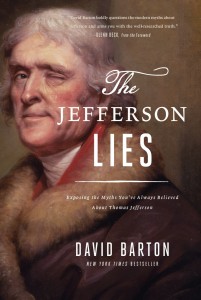On Friday of last week, World Net Daily published something called “Anatomy Of An American Book Banning.” Believe it or not, World Net Daily and David Barton are hoping to convince readers that Barton’s book was pulled from publication due to political correctness. The subtitle of the article is:
How New York Times bestseller was resurrected after falling casualty to political correctness.
Joseph Farah and Barton deserve each other; both engage in historical revisionism. Farah says at the end of the WND article.
Farah added: “Think about all the books that are published every year in America – many tens of thousands. Only one book that I know of in my lifetime has been censored by its own publisher after becoming a bestseller. Only one history book was so banned in the United States, to my knowledge – pulled from the shelves to ensure Americans couldn’t read it and make up their own minds about it. Many books published in America as non-fiction are made up out of whole cloth – and that includes history books with the most preposterous speculation and fantasies. In a free society, that is to be expected. What should never be expected is that controversial books with premises some might disagree with should be banned, spiked, burned or shredded. That’s exactly what happened to this book. And that’s why WND Books is bringing it back into the marketplace.
Is it possible that Farah thinks he is telling the truth? I can’t see how. The book was never “censored,” nor was it “banned in the United States.” The book was not destroyed. WND is not bringing it back into the marketplace. The Jefferson Lies has been available from Wallbuilders since the rights reverted back to Barton after Thomas Nelson stopped publishing it (see this Wayback Machine link for February 2013). It is available now on Amazon and has been for years. In fact, it has been available since at least June 15, 2013 from World Net Daily’s Superstore (see this Wayback Machine link). Let that sink in. Farah said the book was banned and implied it was somehow not in the marketplace. He has been selling it since early 2013.
There is two critical problems for WND’s theory about political correctness and Thomas Nelson: Thomas Nelson publishes many other conservatives and no other books have been pulled from publication during the same time period.
I left a comment after the article and in it named several conservative authors which Thomas Nelson publishes, including a couple published by WND.
Regarding WND’s accusation that Thomas Nelson pulled Barton’s book due to political correctness, please consider that Thomas Nelson currently publishes books by Jerome Corsi and Ben Shapiro. Thomas Nelson publishes Eric Metaxas’ highly regarded book on Bonhoeffer. Other conservatives published by Thomas Nelson include Richard Land, Judge Napolitano, Tom Coburn, William Bennett, Kevin McCullough, Star Parker, Sam Brownback and others. It makes no sense that Thomas Nelson publishes these authors but removed David Barton’s book due to Barton’s conservative ideas.
The politically correct theory fails when one considers there is no pattern, no other book which was removed. Thomas Nelson conducted an internal review and came to the same conclusion as many external critics. No amount historical revisionism by Barton and WND will change what happened.
Happily, there is an antidote to this revisionism.

